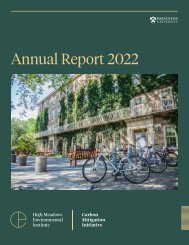CMI Annual Report 2021
You also want an ePaper? Increase the reach of your titles
YUMPU automatically turns print PDFs into web optimized ePapers that Google loves.
Diverging Fate of Oceanic Oxygen Minimum Zone and Its<br />
Core Under Global Warming<br />
PRINCIPAL INVESTIGATOR: LAURE RESPLANDY<br />
At a Glance<br />
Global warming and anthropogenic activities are contributing<br />
to a loss of oxygen in the world’s oceans. However, it is still<br />
unknown if this systematic deoxygenation will expand oxygen<br />
minimum zones (OMZs). These are areas where low oxygen<br />
levels threaten marine life and perturb the carbon and<br />
nitrogen cycles, potentially acting as an amplifying feedback<br />
on climate change. The Resplandy group uses the latest<br />
generation of climate model projections to evaluate how OMZs<br />
will evolve in the future, a key step to anticipate impacts on<br />
ecosystems, ecosystem services (e.g., fisheries), and<br />
greenhouse gas emissions. This work increases our<br />
understanding of an important oceanic impact of climate<br />
change that had many in the scientific community profoundly<br />
worried. It shows that, while serious, expanding oceanic dead<br />
zones do not represent the kind of tipping point that might<br />
significantly alter bp’s plans for the energy transition.<br />
Research Highlight<br />
The ocean has lost dissolved oxygen (O 2<br />
) in response to global<br />
warming in the past 50 years (Schmidtko et al., 2017). A serious<br />
threat of this systematic ocean deoxygenation is the expansion<br />
of tropical oxygen minimum zones (OMZs) located in the<br />
subsurface ocean (Figure 12.1a), such as the already vast OMZ<br />
that is currently expanding over the tropical Pacific Ocean.<br />
Uncertainties in the spatial and temporal evolution of the OMZ<br />
severely restrict our ability to anticipate its ecological, climatic,<br />
and societal impacts (Resplandy 2018; Busecke et al., 2019).<br />
Low oxygenated OMZ waters (typically O 2<br />
















